Poet Langston Hughes (1901-1967) was one of the most influential voices of the Harlem Renaissance. This movement brought national (and international) attention to the voices of Black artists, writers, and musicians. Hughes was known for his simple yet powerful poems that reflected the experience of Black Americans, both the racial injustice and oppression as well as their pride, joy, and dreams. These Langston Hughes poems represent some of his best work, with selections for all ages.
Note: At the time Hughes was writing (1920s-1960s), the word “Negro” was commonly used by the Black community. It hadn’t yet taken on the negative connotation it carries today. Before reading these poems with your students, discuss the history of this word to help them understand its use, past and present.
Get the full text of each poem as a free printable by filling out our quick form.
As I Grew Older
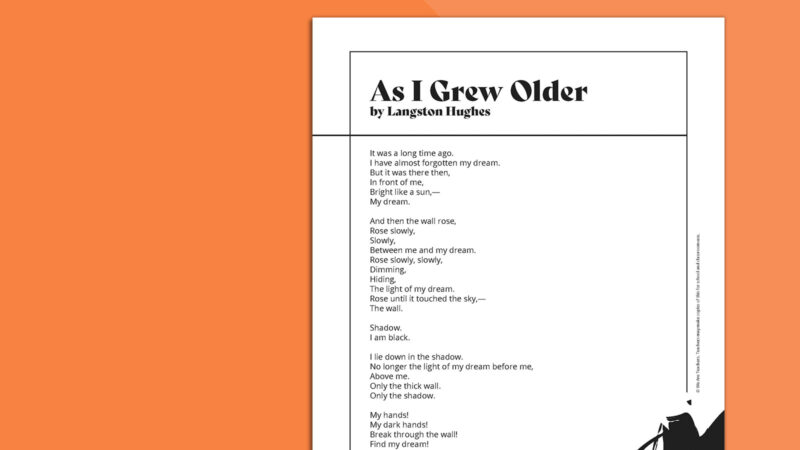
It was a long time ago.
I have almost forgotten my dream.
Like many of the best-known Langston Hughes poems, this one addresses the challenges of achieving one’s dreams in a racist society. At first, the narrator seems to have given up, but by the end, they’re determined to “Break through the wall!” and make their way into the sun.
The Ballad of the Landlord
Landlord, landlord,
My roof has sprung a leak.
Don’t you ’member I told you about it
Way last week?
This poem is excellent for younger students, as the story is easy to understand. A Black tenant begs their landlord to fix leaking roofs and broken stairs but instead is evicted and lands in jail. The injustice is clear, and it’s bound to stir up emotion in readers.
Democracy
I live here, too.
I want freedom
Just as you.
The speaker’s impassioned plea for democracy for all members of society speaks to the reader just as fervently today as it did when it was published in 1949.
Dream Boogie
Ain’t you heard
The boogie-woogie rumble
Of a dream deferred?
During the Jazz Age, white people flocked to Harlem to enjoy the music of Black musicians, which they found joyful and freeing. Here, Hughes examines the irony of that jazz music, inspired as much by pain as by joy.
The Dream Keeper
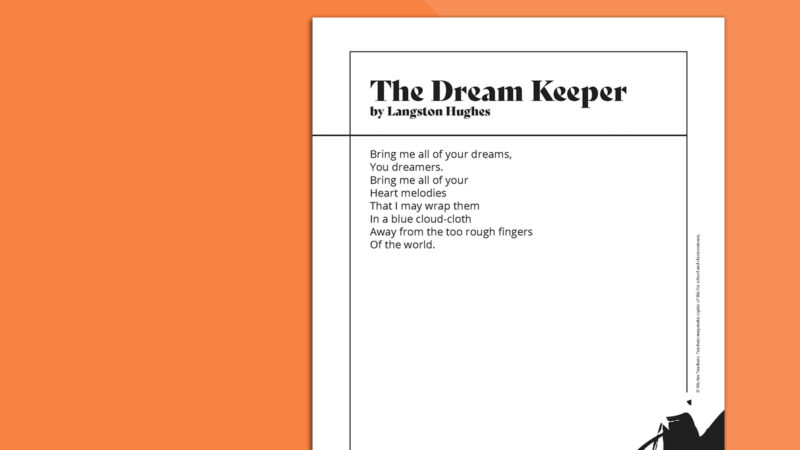
Bring me all of your dreams …
Here’s another poem to share with younger readers. The speaker invites us to bring them our dreams, promising to keep them safe. Ask kids if they think their dreams need to be protected against the realities of the world.
Dreams
Hold fast to dreams …
Dreams are a common theme in Langston Hughes poems, and this is one of his most famous. It urges readers to cling to their dreams, for they make life worthwhile.
Harlem
What happens to a dream deferred?
This may be Hughes’ most well-known poem, contemplating what happens to unfulfilled dreams. It inspired Lorraine Hansberry’s beloved play A Raisin in the Sun.
Harlem Night Song
Come,
Let us roam the night together
Singing.
Not all of Hughes’ work focused on injustice; much of it celebrates the everyday lives of Black people, especially those living in Harlem. This joyous verse is an excellent example of that.
Homesick Blues
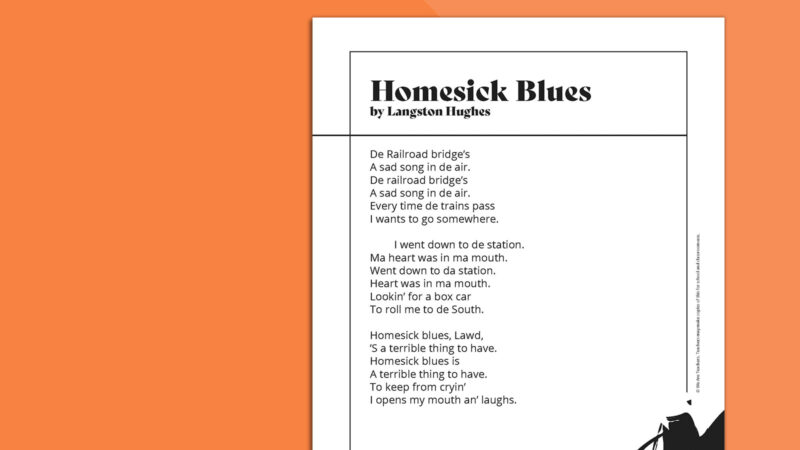
Every time de trains pass
I wants to go somewhere.
Homesickness is something nearly everyone can relate to, but the narrator of this poem seems to yearn not just for another place, but perhaps another way of life. This poem feels more like a song, perfect for reading aloud.
Hope
Sometimes when I’m lonely,
Don’t know why,
Keep thinkin’ I won’t be lonely
By and by.
In four short lines, Hughes evokes strong emotions and a hope for the future. Consider asking students to write further stanzas inspired by this poem, describing how they feel when they’re lonely.
I Dream a World
I dream a world where all
Will know sweet freedom’s way …
More than 20 years before Dr. Martin Luther King Jr.’s “I Have a Dream” speech, Langston Hughes dreamed a similar dream in this powerful poem. King used this poem as the inspiration for his own oration.
I Look at the World
I look at the world
From awakening eyes in a black face …
Do we all see the world in the same way? Are we all treated the same by the world? Hughes knows that we don’t and aren’t, as this poem details.
I, Too
I, too, sing America.
Walt Whitman’s “I Hear America Singing” inspired Hughes to write this poem, noting that the Black American experience could be a very different one than that portrayed in Whitman’s poem.
Kids Who Die
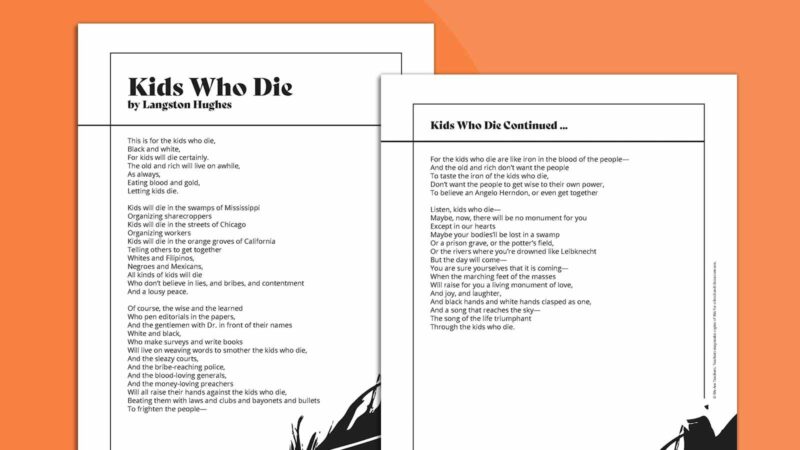
This is for the kids who die,
Black and white …
Children have been victims of racially motivated violence for centuries. Sadly, this Hughes poem feels as relevant and poignant today as it did in 1938.
Let America Be America Again
(There’s never been equality for me,
Nor freedom in this “homeland of the free.”)
The idea of making a country “great again” is nothing new; people have longed for “a simpler, better time” for decades. Hughes speaks to those people, reminding them that for many, America’s “good old times” were anything but good.
Mother to Son
Life for me ain’t been no crystal stair.
A Black mother eloquently urges her son to keep climbing through life, despite setbacks and challenges. This is one of Hughes’ most beloved works, one everyone should read.
The Negro Mother
I had to keep on! No stopping for me—
I was the seed of the coming Free.
This is the mother of more than just one son: It’s the mother of all Black Americans, speaking of her experiences over hundreds of years of enslavement and oppression. She urges her children to remember her, keeping her in their hearts as they continue the fight for equality and equity.
The Negro Speaks of Rivers
My soul has grown deep like the rivers.
Hughes wrote this seminal poem at just 17, as he crossed the Mississippi River on the way to visit his father in Mexico. The metaphorical rivers represent Hughes’ own life experiences and that of the wider Black American population.
Theme for English B
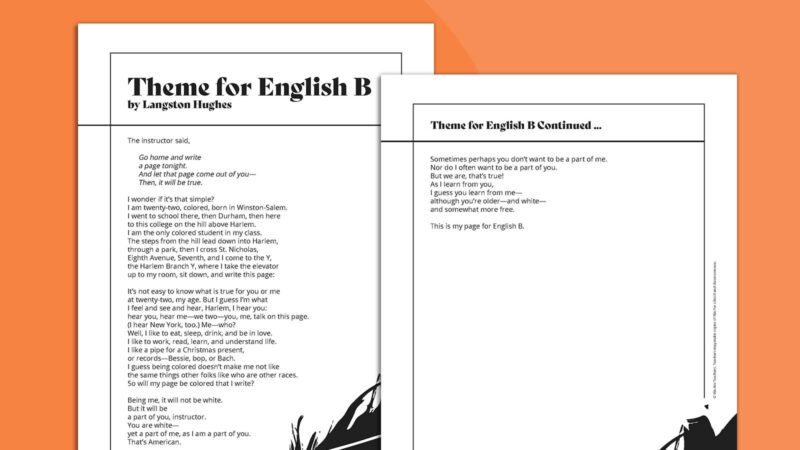
So will my page be colored that I write?
After his English teacher asked students to write “a page that comes out of you,” Hughes reflected on the fact that as the only Black student in the class, his work will necessarily be very different than all the rest.
The Weary Blues
“I got the Weary Blues
And I can’t be satisfied.”
Though it tells the story of one blues musician who’s weary of life, this poem is actually a metaphor for the broader Black American experience. The vivid imagery makes this one ideal to study for poetic devices and language.
Grab your free printable Langston Hughes poems
Just fill out the form for instant access to free printable copies of all the poems above.

